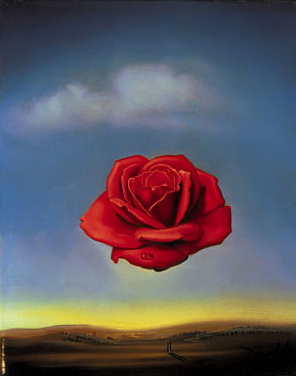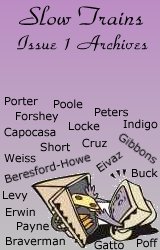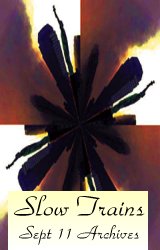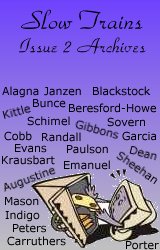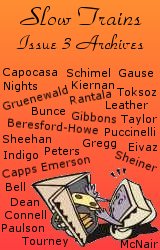
|
writers on the creative life featuring Robert Gibbons
1. When did you start writing poetry? I started writing poetry when I realized I couldn't write plays. I couldn't create a character for the life of me, so that eliminates the novel, too. The desire to write has been with me since before I stopped in front of Emanuel Richardson's house on Tucker's Court and said to myself, at age eight, "That yellow house is where Emanuel Richardson lives. The only black kid in town. Ranch fence. You verbalize everything you see. Maybe that will come in handy when you try to write. I am eight years old. I hate this hat my mother is making me wear. You will always remember this moment." Way in the back of my mind, unverbalized, was the idea that I'd probably be a newspaperman, the only "writing" I could think that one could "do." In college I read all the plays I could get my hands on, which were a lot because I worked in a library. The Greeks, which I devoured. The Romans, which were mechanical and inferior. Ibsen, whom I loved, and Strindberg, whom I convinced myself I understood. I could relate to the darkness, anyway. These were all outside of my classes. Shakespeare was force-fed by a bad teacher. Miller, Albee, Ionesco. It taught me a lot, the independent endeavor, the most important lesson being that I'd never be a playwright. Hell, I could barely open my mouth in a written word, but the desire was intense. That conflict, the desire, and the inability produced some of the most painful years of my life, even though in college my creative writing teacher called one of my pieces, "publishable." That's when I started -- to finally answer your question -- junior year of college. 2. What is your writing routine like? Writing is the first thing I think about in the morning, last at night. Everything goes toward the work. Even a conscious relaxation is a conscious relaxation toward starting up again, an interim attempt not to burn out. First thought: any useful dream material? Last thought: pay attention to the dreams, listen, too. Pen and paper always by the bed. Pen always at hand, in fact a former would-be writer friend of mine once asked me if I had a pen, and I quickly reached into my breast pocket with a quote I'd read somewhere, "Of course, all good writers carry a pen." Should have heard that growl. I write like I walked on Tucker's Court, observing while walking. I love my commute: drive to the harbor; park, walk and board ferry; 35 minutes to read, write, observe on the Ocean!; disembark in front of one of the most beautiful skylines, Boston; walk through the centuries old financial district; descend the stairs of the oldest subway system in America; emerge on the campus of a university. So many opportunities for writing. My briefcase is filled with my life: notebooks, books, the essential yellow legal pad and her husband the black felt-tip pen. Most of my work is written the old-fashioned way, but it must be yellow and black, like the title of my first chapbook in 1980. If I'm full-up, full-steam, and know there won't be a lot of corrections, I'll type straight into the machine. Mid-day's my most creative time, so I try to time my breaks and lunch to blast something out. Right now, after reading Wallace Stevens's comment that W.C. Williams wrote every day "practicing toward perfection," that's what I'm trying to do. I need two cups of coffee, some fruit, and vitamins, which usually clear out most of the wine from the night before. 3. Who are some of your favorite writers, and which writers have had the strongest influence on you? I felt there was an interesting distinction here when I first read the question. Then yesterday on the boat I read someone else say that Lorca can influence no one. That's so right! There's a certain genius that you can't learn from, you can only admire, stand in awe: Lorca, Rilke, Rimbaud. Then there are the ones you can learn from. Charles Olson was a great teacher, in fact Ed Dorn wrote something like "Charles Olson is a great teacher the way Euripides was a great teacher." Olson helped teach me the precision of the present second. "Start from where you are," he wrote. Crazy that one has to learn that from someone else, but when you're a young writer you want to start from where you've been, what you know, what someone else writes like, what you want to say when you're famous, a million opportunities at false starts, oh the false starts! I won't delve too far into it, but the big three for me right now are Kristeva, Duras, Cixous -- a Bulgarian woman, a French woman, and an Algerian woman, all with one thing in common -- they know how to write, and they're willing to share the process. Kristeva is the best writer in the world right now. Her idea of the "chora," that internal vibration that precedes speech, is brilliant. I recommend reading Desire in Language, Black Sun, and her study of Proust. Her book Tales of Love saved my life. Duras can write a woman's body, and her silence. She thought that the only writing worth reading is woman's, man's has been written out. She's right. You better have a lot of feminine, men! Cixous's "To Live the Orange" is a tonic, an elixer, her Three Steps on the Ladder of Writing, with its schools of Dreams, Roots, and Death is worth all the creative writing programs I could imagine. 4. Besides writing, what are you most passionate about in your life? My wife, certainly, who is also a writer. We have an intense, conversational, erotic relationship. "Talk is love," wrote Olson. Wine, we've written about wine together, even had a trip to the Cannes Film Festival sponsored by Piper-Heidsieck Champagne in 1994. Pulp Fiction won. We had dinner at the Piper villa with the president of the Jury that year, Clint Eastwood, though I didn't get a chance to speak to him amid the throng. In fact, I don't think anyone spoke to him. He looked lonely at the head table. I wish I'd remembered that he did that film documentary, Straight, No Chaser, on Thelonius Monk, because I'd never even seen a Clint Eastwood movie until that night. The Outlaw Josie Wales, was refurbished by the British Film Institute and Piper. So, yes, my wife, and wine. Passions. Reading. French cinema. Anything with Juliette Binoche. I cook with relish, if not with passion, sorry for the pun. Snow. I love what Olson called, "You gentlest water." Art, of course. I worked at the National Gallery of Art Library in Washington for four years. Each day I walked under the Calder mobile. On any given day, depending on my mood, I could spend time in front of Gauguin's Self-Portrait, Vermeer's, Girl with the Red Hat, or go outside to contemplate Noguchi's Great Rock of Inner Seeking. 5. What kind of music do you enjoy, and do you find that music has an influence on your writing? I scrolled down to this question without mentioning jazz as a passion, which I would call it. As much the music, the history, the aura, the pictures, photos, Monk, O'Hara mentioning Miles getting beaten by the NYPD, Kerouac's riffs learned from Dexter Gordon, Dexter Gordon acting in the film, Round Midnight. In Ken Burns's series one commentator observes about the Savoy in NY in the thirties that everything outside of the jazz dancehall was segregated. It was the only place where whites and blacks were welcome together. He went on to say that he thought that one word, "Welcome," could be the basis of all civilization. Now that's brilliant, and it comes out of jazz. It's a big American Saga, what Bird went through, what he and Dizzy did together, not to mention Saint Coltrane, and all the people he had working with him. I was in the front row in a small jazz club witnessing Miles play, Miles's anger, silences, hatred, genius. It was 1969, I was still in college. If music has any influence on my writing it's the act of freedom associated with jazz, the spontaneity, the escape from the chains of syntax. 6. Where are your favorite places to travel? Paris, anywhere in France, Nice, Cahors, Reims. Gloucester, Massachusetts, where Olson lived and
wrote. Maine, Portland, or at my painter friends, Brad and Rebecca's, place in Brownfield with its huge post and beam barn studio. I like going back to DC, where I worked, but I try not to step foot in Virginia. I wasn't surprised to find out Kerouac hated Virginia. I have fond memories of three months in Mexico. I did the Grand Tour of Europe when I was twenty, an experience that still often enters my writing. Baudelaire said all forms of transportation are poetry, especially the ship. Obviously he wasn't around for the SUV. New York. We went last week, meeting the greatest American publisher of all time, Barney Rosset. You know, Grove Press, D. H. Lawrence, the battle against censorship, Henry Miller, Evergreen Review. Saw what my wife called, "The wounded city," with Ground Zero visible from our hotel window. The desk clerk said we'd have a view of the city! 7. Where do your best ideas come from, or, what creates your most inspired state? I don't deal in ideas. But I do heighten my senses at every chance. My writing is extremely physical. Duras in an essay says the writing is a "black block" within us that must be pulverized, "It's almost a matter of muscularity," she says. This process of heightening the sense is essential for me. When one heightens one's senses outward, the internal mechanisms chime in, the organs want their say, the bones, testosterone, memory, blood, trauma, oh, trauma, experiences of all kinds get hooked on language, language gets hooked on itself, and suddenly you're rolling, rolling until the natural physical law of inertia slows you down. Heightening the senses is the great shield against Hubris, too. I wish I could teach all these stockbrokers I travel with on the ferry about heightening the senses instead of calculating the dollar, the big deal. Each piece of work I do must have the validation of an erotic charge. Language for me is based on this cathexion of desire toward something, an angle, a color, the cut of a dress, a leg, a brick, a ray of light, a single word, a dream image, a shard of glass, an art object, an African mask, a sentence overheard, etc.... Sometimes, but only sometimes, the desire to write is charge enough, but during that process Eros must appear, a love for what I am doing. 8. Do you have any interesting vices that you'd care to share, and have they helped or hindered your writing? Wine is a major vice. When I was in Nice in 1967 we could bring our empty bottles to a place across from Chez Georgette's, where we ate lunch every day for 2.5 francs, this place across the street where three huge tuns of wine were embedded in the wall, where they would fill our bottles for one franc. I got in the habit, even then, of bringing in 3 bottles, and taking them back to the overlook park where we slept. Granted I shared it with my friends, but sometimes my friends weren't there. I like to think wine has helped my writing. Wine's like that. 9. Yeats said that the only things worth writing about are sex and death -- what would your list include? Here's how I'd view that statement, which wouldn't contradict Freud or Lacan at all. Freud single-handedly discovered the "Death Drive." In his very technical tract Beyond the Pleasure Principle, he leads us along in a very long, biologically esoteric way, proving that the only thing "beyond" the drive toward "pleasure" is the drive toward the ultimate peace of inorganic matter. It's fascinating! When I write best I'm riding these two drives at the same time, these two waves that language hooks into, both unconscious, writing is the act, Kristeva says, a sublimation of the drives, and she says sublimation of the drives is a satisfaction in itself. Is there a greater satisfaction than creating the act that presses its pen down on two powerful waves, I mean, I've never had a desire to surf, but I love body surfing, and maybe that's what writing is, a form of body surfing the two most powerful drives known to Freud, Lacan, and Kristeva, the erotic, or life force, and what is beyond, for it is "beyond" is it not, the death drive? Anais Nin said writing pornography is the road to sainthood. I love the transgressive nature of writing. Sex and death, everybody, writing is about sex and death! 10. What's next for your writing? If I live in the moment the writing manages to take form. That's my plan. |
